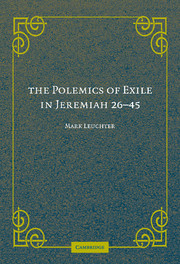Book contents
- Frontmatter
- Contents
- Acknowledgments
- List of Abbreviations
- Note on Citations
- Introduction
- 1 The Hermeneutics of Citation: Jeremiah 26
- 2 The Identification of Legitimate Israel: Jeremiah 27–32:15
- EXCURSUS 1 THE REDACTION OF JEREMIAH 1–25:13+OAN
- EXCURSUS 2 THE REENGAGEMENT OF THE ROYAL LINE IN JEREMIAH 33:14–26
- 3 The Standards of Faith and Intermediation: Jeremiah 34–36
- 4 The Fall of Judah, the Descent into Egypt, and Baruch ben Neriah: Jeremiah 37–45
- EXCURSUS 3 THE “WORDS OF JEREMIAH” AND SERAIAH'S COLOPHON IN THE MT AND LXX TRADITIONS
- 5 The Polemics of Exile
- 6 The Exilic Coalition between the Shaphanides and Levites
- Conclusion
- Notes
- Bibliography
- Author Index
- Scriptural and Extra-Biblical Texts Index
- Subject Index
6 - The Exilic Coalition between the Shaphanides and Levites
Published online by Cambridge University Press: 27 July 2009
- Frontmatter
- Contents
- Acknowledgments
- List of Abbreviations
- Note on Citations
- Introduction
- 1 The Hermeneutics of Citation: Jeremiah 26
- 2 The Identification of Legitimate Israel: Jeremiah 27–32:15
- EXCURSUS 1 THE REDACTION OF JEREMIAH 1–25:13+OAN
- EXCURSUS 2 THE REENGAGEMENT OF THE ROYAL LINE IN JEREMIAH 33:14–26
- 3 The Standards of Faith and Intermediation: Jeremiah 34–36
- 4 The Fall of Judah, the Descent into Egypt, and Baruch ben Neriah: Jeremiah 37–45
- EXCURSUS 3 THE “WORDS OF JEREMIAH” AND SERAIAH'S COLOPHON IN THE MT AND LXX TRADITIONS
- 5 The Polemics of Exile
- 6 The Exilic Coalition between the Shaphanides and Levites
- Conclusion
- Notes
- Bibliography
- Author Index
- Scriptural and Extra-Biblical Texts Index
- Subject Index
Summary
there is strong scholarly consensus that the shaphanides in exile maintained close connections to the royal circle of Jehoiachin in Babylon and were responsible for a significant amount of redactional activity during the period of Babylonian domination. As discussed in the present study, the development of the book of Jeremiah was paramount to this literary endeavor and indeed serves as a key to understanding its ongoing development. The exilic adjustments and expansions to the preexilic literary collections reflect an attempt to establish ideological continuity from one epoch to the next, despite the obvious sociological, political, and theological disruption represented by the death of Josiah, the dissolution of Judah's autonomy, and the conditions of expatriate life. These adjustments are deployed to provide comprehensiveness to the literature, and thus to maintain the influence and vitality of the political ideology and scribal group standing behind it.
The Shaphanides, however, would not have been the only group interested in preserving the Deuteronomistic tradition in exile. The preexilic version of this tradition attempted to appeal to a variety of Levitical groups, and the narrative regarding Josiah's reform activity in Judah suggests that the Levites of Josiah's realm did conform to the Deuteronomic program. The reform may have prohibited them from engaging in local cultic activity in the wake of Josiah's centralization efforts, but it provided them with regional juridical authority as executors and licensed exegetes of the written Deuteronomic legislation, stationed in each village or city gate.
- Type
- Chapter
- Information
- The Polemics of Exile in Jeremiah 26-45 , pp. 166 - 176Publisher: Cambridge University PressPrint publication year: 2007



